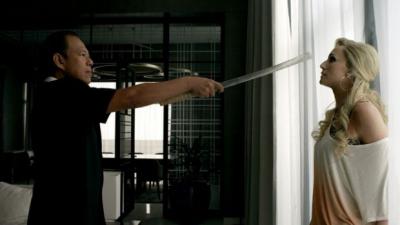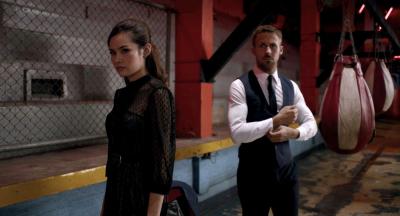By: debbie lynn elias
One can always count on Nicolas Winding Refn to deliver something provocative, evocative and eclectic that’s guaranteed to be talked about. As we saw with Drive, partnering Refn and Ryan Gosling is just an added insurance policy, and now with ONLY GOD FORGIVES the result is already highly divisive. As with the tacitly powerful and compelling Drive which delivered over-the-top scene stealing performances by supporting actors Ron Perlman and Albert Brooks, ONLY GOD FORGIVES can boast a mind-blowing Oscar-worthy turn by Kristin Scott Thomas which together with Larry Smith’s also Oscar-worthy cinematography overshadows a less than stellar showing by Gosling.

Brothers Julian and Billy live in Bangkok working on the outside as muy-thai fight managers and promoters while using the “legitimate” work as a cover for the family drug-smuggling enterprise. As different as night and day, Julian and Billy are not at all what you’d call close. Where Julian is the more practical and methodical, Billy is the epitome of violent rage, often leaving Julian to clean-up after him. But one thing Julian can’t clean-up – Billy’s rape of a 14-year old prostitute and subsequent murder by carving.
With his own patented brand of Thai justice, Chang, the lead investigator on the murder and someone who sees himself almost as an avenging angel, doesn’t arrest Billy but rather, brings in the dead girl’s father, lets him carve up Billy in eye-for-an-eye fashion, but then chops off the hands of the father.

With her #1 son now dead as the result of what she deems a brutal murder, the brothers’ mother, Crystal, arrives in town determined to force Julian to seek revenge on her behalf and avenge Billy’s murder. With no love loss between mother and son, with every passing moment the level of resentment and dare we say, hatred, Julian has for his mother becomes more than apparent. It’s clear that Billy was her favorite child and Julian nothing but leftovers for her. Nevertheless, Julian attempts to do his duty and fulfill his mother’s orders. He has his men go after Chang (who is blamed for Billy’s death because he allowed the victim’s father to kill him) but to no avail. He then must face not only Chang, but his mother as vengeance comes to an explosive conclusion.

Taciturn yet again, but moreso in ONLY GOD FORGIVES than in any other role, Gosling fails to engage with the audience or deliver something “new” instead creating an uneven presence on the screen. Quite honestly, I am beginning to question Gosling’s comprehensive reading skills given that in his most recent films, in particular, Drive, The Place Beyond the Pines, and now, ONLY GOD FORGIVES, there is little to no dialogue for Gosling. This begs the question, although Refn freely admits to liking “the language of silence” when constructing his films. Here, as Julian, it reaches a point with Gosling’s performance that his tacit deliberateness and drawn out slow methodology becomes tedious. One interesting aspect of Julian, however, is the grace and forgiveness that he shows for those that, despite his mother’s instructions, he doesn’t kill because his brother’s death was not by their hand. While this character trait goes more to the script, Gosling eloquently and emotionally conveys this aspect of Julian. According to Refn, when Gosling discussed ONLY GOD FORGIVES with him, he described it as “If Drive is heaven, then this is hell.” Deeming Gosling “a very brave actor willing to take on challenges”, Refn has nothing but admiration for him for tackling this film. Perhaps the two scenes in the film that define Gosling’s bravery best involves a climactic moment with Chang’s daughter where, in total silence, we are able to see Julian’s continual internal struggle to find peace, to become better than what his mother has made him to be. On the other hand, a show-stopping exhibition of calm rage between Gosling’s Julian and Scott Thomas’ Crystal just explodes with raw emotion.

As Crystal, Kristin Scott Thomas is insanely delicious channeling the harsh look of a 1970’s Jerry Hall and overdone, over-bleached Donatella Versace. The look, the attitude – deliciously malevolent and perverted. Not the first person one would think of for this role, Refn laughingly notes, “She had it in her. . . One of the things when you make films like this is you have to be very conscious of the cheaper you make it, the less pressure there is on you. And so, I didn’t have money for any stars or anything like that, so I was casting unknown actresses. And then, I got a call asking if I wanted to meet with Kristin Scott Thomas who’s now KST, and I was like, ‘Yeah, absolutely, if she would be interested. What would she cost?’ So we met in Paris. I’ve only seen her from the movies.” As if KST’s prior performances weren’t enough of a reason to cast her as Crystal, important to Refn was that “ My mother really likes her.” On meeting KST, Refn immediately “saw that she has no problem turning on the bitch switch. And she wanted to do something that I think was very different to what she had done before.” But for Scott Thomas, it was essential that she “transform myself.” One of the major ways she transforms herself beyond her physical appearance is with her dialogue. Never would one expect the words “cum dumpster” to come rolling off her tongue with acrid fluidity when addressing Julian’s “girlfriend” who’s come to dinner with them.

Crucial to the construct of Crystal, Refn gleefully explains how the phrase “cum dumpster” came to be. “Well that word came about because I shoot films in chronological order, which means it’s scene 1, 2 and 3. I do that on my films because I like the part about the canvas that you can shape and change and maneuver and alternate a bit like a picture and repaint a picture if you don’t like it or you need to change it. . .I was sitting with Ryan talking about what would his character like to hear for this specific scene, what would be needed for his reactions and so forth, and the idea [came about] that the mother degrades him sexually by talking about his genitals in front of this girl. It’s like the worst nightmare for any man to bring home a nice Asian girl and his mother just devours her. . .So I said to Ryan, because English is my second language, ‘What’s the worst thing that you can call a woman in America?’ and he said, ‘I’ll give you a list.’ So he came up with a list and what really worked out was the word “cum dumpster,” which he had to explain to me what it meant the first time around. . . The next part was going to KST [Kristen Scott Thomas] and telling her that she had to say things like this. She’s at an age where you may be a little bit sexually repressed. So, for her to say those words, she was a bit like, ‘Oh…’ And then, she had to train with a speech coach because she is English and she very much works on dialogue. So they did do sessions with her like, cum dumpster, [demonstrating various ways to pronounce the words] where they have to feel the singing of the voice because it’s in there and she would walk on set going, [a dead on KST mimic by Refn here] ‘Cum dumpster. Cum dumpster.’ It was the most used word that entire day. It took her six takes to even get it right. But then it became quite fun.”

Fascinating performance comes from Vithaya Pansringarm as the police chief/avenger Chang. From a ninja stealthiness to the stick-up-his-ass posture and stride to the primness of the way he sings in a nightclub to the paternal softness with his daughter, Pansringarm delivers a lovely ambiguity of character. Interesting is that when Pansringarm sings, there is no subtitling of the lyrics. For Refn, the omission of English subtitles was deliberate believing “it would almost be ruining the image if you suddenly start subtitling something that’s more about the sound in a way. But specifically, the songs are about vengeance coming. They’re very much folk tales because they’re based on Isaan music, some of it, which is part of Thailand’s country and western music, but the lyrics a lot of the times are very much fable stories.”
Written and directed by Nicolas Winding Refn as a story predicated on revenge, it stands to reason that the visual palette will be strong, forceful and violent. And it is. So much so that someone needs to start the Oscar campaign now for DP/Cinematographer Larry Smith and Production Designer Matthew Newman. Mind-blowing perfection. The calculated deliberateness of the lighting and the color palette of blood red ringed with gold, contrasted with the light and beauty of police chief Chang’s home and his little girl – those visuals and that tonal bandwidth tells more about the story and the film than anything else. This is a cinematic vision at its finest.

Production design stuns, particularly in the hotel suite design, the corridors of the “fight club”, the wallpaper of the headless dragons all intertwined with jagged spiked teeth protruding every edge of the dragon bodies. Lovely rapier elegance that matches the color and cinematography. The soft serene saturated beauty of the karaoke club with the soft blue light, twinkle lights, the disco ball look of stars swirling across the patrons and walls as if in a dream. Stunning. Almost ethereal.
When it came to designing the visual tone, according to Refn, “ I had this notion of going like this, which was the erection, the extension of a male power, into becoming this, which was submission. I thought, ‘There’s a movie in this movement.’ I like that way of making film because it’s like painting a picture. You start one place and then it moves and mutates. And then, practically, when I wanted to shoot the movie in Bangkok, it was because the nights of Bangkok are very particular. They’re like a magical landscape because the city itself is so enormous and insane, and you don’t understand how there’s logic in this city. The buildings are so old and new, and they’re very mysterious because the heat is so intense that nobody ever opens windows, so almost everything is just closed down. The lighting and the fluorescentness of it is the whole Asian acceptance of the spiritual world next to the world of reality going hand in hand as something that’s never explained or it’s just accepted. Those are very interesting concepts to make a movie about.”
With the “slice and dice” and piercing violence, each act is mesmerizing to watch. Refn builds the tension with the calculated deliberateness of the film as a whole but then with the quickness of each slice of the ninja saber or stealthy one-elegant-thrust of a piercing stab with skewers and paring knives in the club (very very very cool scene by the way) one is caught off guard and taken by surprise with the violence that comes from such elegant movement.
Hand in hand with establishing the visual tone is Matthew Newman’s editing. Heart-stopping, it is particularly dramatic and effective in eliciting powerful emotional response with climactic scenes of violence, creating a visceral contrast with serene beauty.

Icing on the cake is a score by Cliff Martinez. Because there is so little dialogue, sound design and music are critical to the film with each element becoming a character unto itself. According to Martinez, “My biggest challenge in this film, aside from the general idea that it was almost a silent film, which always draws much more attention to the music, was Nicolas gave me the scene of the one-armed man telling Ryan Gosling the story of what was then called the Angel of Vengeance or Chang, the Lieutenant. When Nicolas sent me the scene, I called him up. I said, ‘Okay, now you’ve gone too far. Not only is there no dialogue in the film, but I see the guy’s lips moving and there’s still no dialogue. What’s up with that?’ Nicolas said, “Yeah, it didn’t really look right. He kept pronouncing it Angel of Wengeance and it had comical overtones and we can’t use it.’ So I said, ‘Okay, so it’s up to me to tell the whole story of this mythical kind of…he’s supposed to be a supernatural or semi-supernatural superhuman character or a myth, a legend that may or may not even exist.’ So it was left to me to do that.” Influenced by a number of temp scores suggested by Refn as reference, a stand-out for Martinez in helping develop the ONLY GOD FORGIVES compositions is Bernard Hermann’s score for The Day the Earth Stood Still. “In the general direction as the general approach that you want the film to go in”, Martinez infused the style of Hermann with “a fair amount of my musical identity as well.”
With a Malickesque feel in its organic philosophy, ONLY GOD FORGIVES is a visually sumptuous feast, deliberate and controlled in its design, calculated to incite disturbing emotion and punctuated with a scene stealing performance by Kristin Scott Thomas. No one needs forgiveness for ONLY GOD FORGIVES.
Written and Directed by Nicolas Winding Refn
Cast: Ryan Gosling, Kristin Scott Thomas, Vithaya Pansringarm












